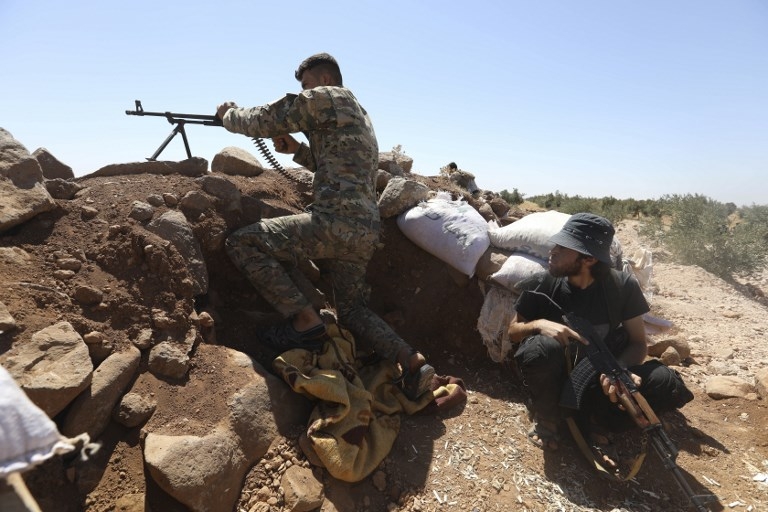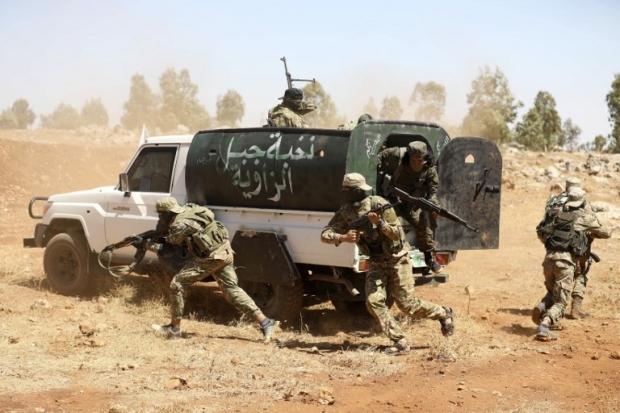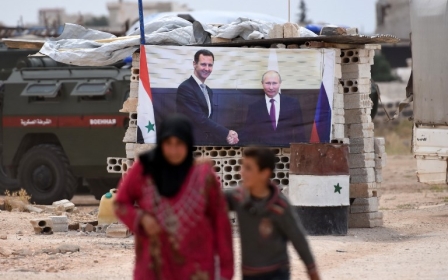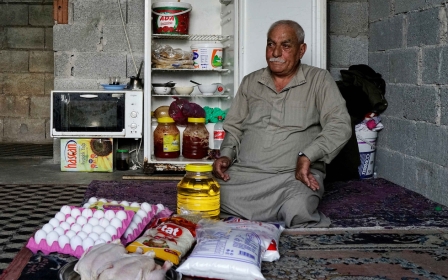Has Trump's attack on the Turkish lira unlocked a Syria deal?

“He does things the right way,” US President Donald Trump said of Turkish President Recep Tayyip Erdogan last month.
It shouldn't have been a surprise; the two men have much in common, as nationalist, tub-thumping autocrats with a contempt for constitutional limits on presidential might, who see few problems that cannot be solved through the right combination of willpower and firepower.
Trump's comment specifically referred to Erdogan's ability to ignore his own parliament, and was followed up with a mutually aggrandising fist-bump. Yet the budding bromance was short-lived. Days later, Trump entered his now-infamous, two-hour private meeting with Russian President Vladimir Putin in Helsinki. But what did they discuss?
Proxy battleground
According to their own account, one of the main items on the agenda was Syria, which for seven years has been the battleground for a proxy war between, among others, the US and Russia. In this war, Turkey and the US were supposed to be on the same side, yet Trump, on Syria as on so many issues, has been ambivalent as to US goals in the conflict.
The original objective, of course, was to transform Syria - an independent regional power allied to both Iran and Hezbollah - into a failed state on the Iraq/Libya/Afghanistan model. Yet the Syrian state, with a level of popular support surprising to those Western observers susceptible to their own propaganda, stubbornly refused to be destroyed.
Russian intervention helped to turn the tide starting in September 2015, and since then, one victory after another ... has made it clear that not only will the Syrian government survive, but it will very likely restore its authority nationwide
Russian intervention helped to turn the tide starting in September 2015, and since then, one victory after another - most notably in Aleppo - has made it clear that not only will the Syrian government survive, but it will very likely restore its authority nationwide.
Most rebel-held cities have been retaken by the Syrian army, while the Kurdish People's Protection Units (YPG) - who have always, correctly, feared the US-backed sectarian insurgency far more than they have feared Syrian President Bashar al-Assad - have entered into negotiations with Damascus, leading to a growing role for the Syrian army in YPG-held areas as well.
The only major population centre still fully outside of government control, then, is Idlib, home to almost three million people, and largely under the control of Hayat Tahrir al-Sham (HTS), the latest rebrand of Syria's al-Qaeda franchise.
Imminent offensive
All the signs suggest that a government offensive on this last rebel stronghold is imminent, with government forces amassing at the western edge of the province near Jisr al-Shughur. Yet one major obstacle remains: Turkey.
Turkish troops are now present on the ground in Idlib at around a dozen “observation posts” set up under the terms of the de-escalation zones agreed to by Iran, Turkey and Russia at the Astana conference, making a direct assault on the governorate very difficult without risking a major escalation with Turkey, which is still, despite everything, a NATO member.
Furthermore, Turkey wields extensive influence over many of the rebel groups present in Idlib. Back in May, Turkey formed a coalition of around a dozen anti-government militias there under the banner of the National Liberation Front (NLF). Earlier this month, they persuaded two HTS splinters - Nour al-Din al-Zenki, the US-UK-funded group infamous for their livestream beheading of an 11-year-old, and Ahrar al-Sham, another al-Qaeda in all but name and attitude to the West - to sign up.
Russia, then, seeks to pressure Turkey into agreeing to, if not a surrender of the province, then at least the removal of its troops, and a negotiated settlement with its NLF proxies - perhaps even a joint operation against HTS by the Syrian army, the NLF and Russia.
Idlib settlement
This might be acceptable to Turkey, given a guarantee of influence in the aftermath, and to Russia, but it would be very hard to swallow for the Syrian government, which has no desire to share power with al-Qaeda-lite. What Russia needs, then, in order to oversee an Idlib settlement on its own terms, is some kind of leverage over both Turkey and Syria, in order to gain their acceptance for its own proposals for dealing with Idlib.
Enter Trump. His attack on the Turkish currency - already under pressure from the rising dollar due to its huge mountain of debt - precipitated an unprecedented decline in its value, only stemmed by a $15bn loan from Qatar. But this is likely to be only a temporary solution. Cut out of US markets and facing further sanctions over Turkey's purchases of Iranian oil, what Erdogan needs is a new, more dependable ally than his volatile, erstwhile buddy in the White House.
Enter Putin. On 10 August, after the Trump tweet that triggered the lira's plunge, Erdogan immediately spoke to Putin to discuss “trade and economic cooperation”. Days later, Erdogan explained that he had “made advancements in our ties with Russia in accordance to our benefits and interests”.
This was followed up with a visit to Ankara by Foreign Minister Sergei Lavrov and, last week, Turkish Foreign Minister Mevlut Cavusoglu was received in Moscow by Putin himself.
Russia had already reaffirmed its commitment to the delivery of its much-feared S-400 missile system by early next year, and made some vague promises to use the lira in its transactions with Turkey at some unspecified point in the future. But nothing new, nothing concrete.
Russia was signalling that it was ready to come to Turkey's aid, but at a price. That price may well be Turkish support for Russian proposals in Idlib, which Putin will be hoping to finalise in the forthcoming Syria summit between Turkey, Russia and Iran next week.
Claiming victory
Already, the statements coming out of Turkey after the various meetings have indicated something of a shift in the Turkish position, with Cavusoglu admitting the presence of “terrorist groups” in Idlib that need to be “neutralised” in order “to alleviate the concerns of our Russian counterparts”.
This is the real Trump-Russia collusion: not in backroom campaign meetings, but hiding in plain sight
At the same time, Putin can use the prospect of Turkish acquiescence to an operation in Idlib as leverage on the Syrian government to accept both of its own proposals for recognition of Kurdish autonomy and Israeli demands to reduce the Iranian presence in Syria.
Such an outcome would allow both Israeli Prime Minister Benjamin Netanyahu and Trump to claim a much-needed victory in their campaign to “roll back” Iran, while simultaneously increasing Iranian and Syrian dependence on Russia.
Trump's attack on the lira, in other words, by throwing Turkey into Moscow's arms, might have been the key to unlock the final stages of a Syria settlement under Russian tutelage. This is the real Trump-Russia collusion: not in backroom campaign meetings, but hiding in plain sight.
- Dan Glazebrook is a political writer and editor of stopstarvingyemen.org. He is the author of Divide and Ruin: The West's Imperial Strategy in an Age of Crisis, and blogs at danglazebrook.com.
The views expressed in this article belong to the author and do not necessarily reflect the editorial policy of Middle East Eye.
Photo: Rebel fighters take a position in the countryside of northern Idlib on 17 August 2018 (AFP)
This article is available in French on Middle East Eye French edition.
New MEE newsletter: Jerusalem Dispatch
Sign up to get the latest insights and analysis on Israel-Palestine, alongside Turkey Unpacked and other MEE newsletters
Middle East Eye delivers independent and unrivalled coverage and analysis of the Middle East, North Africa and beyond. To learn more about republishing this content and the associated fees, please fill out this form. More about MEE can be found here.






